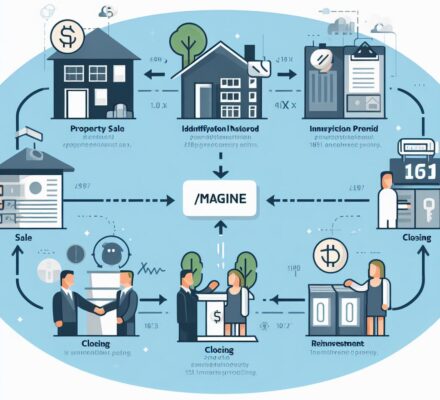Are you looking to maximize your tax benefits when it comes to property exchange? Well, look no further!
In this article, we will reveal an 11-item list of key tax benefits that you can take advantage of.
From capital gains tax deferral to increased cash flow through depreciation, these benefits will help you save money and make the most out of your property investments.
Get ready to unlock the secrets to a more profitable property exchange!
Key Takeaways
- Capital gains tax deferral allows for more flexibility and financial control in managing investments.
- Step-up in basis can minimize tax liability and result in potential tax savings.
- 1031 exchange offers benefits such as deferred capital gains taxes, preservation of equity, and diversification opportunities.
- Tax-free exchange of investment properties allows for deferring taxes on capital gains and accelerating portfolio growth.
Capital Gains Tax Deferral
One of the key tax benefits of property exchange is the deferral of your capital gains tax. When you exchange your property for another similar one, the capital gains tax on the appreciation of your property is postponed, allowing you to defer paying taxes on those gains. This is a significant advantage as it provides you with more flexibility and financial control in managing your investment. By deferring the capital gains tax, you can reinvest the proceeds from the sale into a new property, potentially generating even more wealth in the long run.
The deferral of capital gains tax is especially beneficial if you plan to reinvest the proceeds into a property with a higher market value or better income potential. By deferring the tax, you can leverage your gains and potentially increase your investment portfolio. This allows you to maximize your returns and build wealth over time.
Furthermore, the deferral of capital gains tax can provide you with additional cash flow, as you won’t have to immediately allocate funds for taxes. This can be particularly advantageous if you’re looking to expand your real estate holdings or invest in other areas.
In addition to the deferral of capital gains tax, another key tax benefit of property exchange is the step-up in basis. This allows you to increase the tax basis of the property received in the exchange, which can result in lower capital gains tax liability when you eventually sell the property. Now, let’s explore this benefit in more detail.
Step-Up in Basis
To benefit from a step-up in basis, you can increase the tax basis of the property received in the exchange. This can be a significant advantage when it comes to minimizing your tax liability. A step-up in basis occurs when the fair market value of the property received in the exchange is higher than the tax basis of the property you gave up. This means that when you sell the newly acquired property, your taxable gain will be based on the stepped-up basis, rather than the original basis.
Here is a table to help illustrate the concept:
| Property Given Up | Tax Basis | Property Received | Fair Market Value |
|---|---|---|---|
| Property A | $100,000 | Property B | $150,000 |
In this scenario, the step-up in basis would be $50,000 ($150,000 – $100,000). When you sell Property B, your taxable gain will be calculated based on the stepped-up basis of $150,000, rather than the original basis of $100,000. This can result in significant tax savings.
The step-up in basis is just one of the many benefits of a property exchange. In the next section, we will discuss other exchange benefits that can help you optimize your tax situation.
1031 Exchange Benefits
To further optimize your tax situation, consider the various benefits of a property exchange. Here are five reasons why property exchange can be advantageous for you:
- Deferred Capital Gains: By swapping your property for another, you can delay paying capital gains taxes until you sell the new property.
- Preservation of Equity: Property exchange allows you to preserve your equity by deferring the tax liability, giving you more funds to invest in a new property.
- Diversification: Exchanging your property provides an opportunity to diversify your real estate portfolio by acquiring a property in a different location or with a different type of property.
- Elimination of Depreciation Recapture: When you sell a property, you may have to pay depreciation recapture taxes. With a property exchange, you can avoid this tax liability.
- Flexibility in Property Selection: Property exchange gives you the flexibility to choose properties that better suit your current investment goals and objectives.
Considering these benefits, it becomes clear that property exchange can be a valuable tool for optimizing your tax situation and maximizing your investments.
However, it’s important to note that not all property exchanges are tax-free. In the next section, we’ll discuss the tax-free exchange of investment properties and the specific requirements that need to be met to qualify for this tax advantage.
Tax-Free Exchange of Investment Properties
If you’re considering a property exchange, you may be eligible for a tax-free exchange of investment properties. This type of exchange, also known as a 1031 exchange or like-kind exchange, allows you to defer paying taxes on the capital gains from the sale of your investment property if you reinvest the proceeds in a similar property. By taking advantage of this tax benefit, you can potentially increase your investment portfolio and defer your tax liability.
To qualify for a tax-free exchange, the properties involved must be held for investment or used in a trade or business. This means that personal residences or properties held primarily for personal use don’t qualify. The properties must also be of like-kind, which means they’re of the same nature or character, even if they differ in grade or quality.
One major advantage of a tax-free exchange is that it allows you to defer paying taxes on the capital gains, which can provide you with more funds to reinvest in a new property. This can help you grow your investment portfolio faster and potentially increase your overall wealth. Additionally, by deferring taxes, you have more capital to work with, allowing you to potentially purchase a higher-value property.
It is important to note that the tax deferral isn’t permanent. When you eventually sell the new property, the deferred gain will be recognized and subject to taxation at that time. However, by strategically planning your real estate investments and consistently utilizing tax-free exchanges, you can potentially defer taxes indefinitely and continue to grow your wealth.
Increased Cash Flow Through Depreciation
You can increase your cash flow through depreciation by taking advantage of the tax benefits of a property exchange. Depreciation is a tax deduction that allows you to recover the cost of an income-producing property over time. By properly depreciating your property, you can reduce your taxable income and increase your cash flow.
Here are five key ways depreciation can help boost your cash flow:
- Accelerated depreciation: The IRS allows for accelerated depreciation methods, such as bonus depreciation and Section 179 deduction, which can significantly increase your depreciation deductions in the early years of property ownership.
- Cost segregation: By using cost segregation studies, you can allocate certain components of your property to shorter depreciation periods, allowing for higher depreciation deductions.
- Improvements and repairs: Any improvements or repairs made to your property can be depreciated over their useful life, providing additional tax deductions and increasing your cash flow.
- Land improvements: Depreciation can also be claimed on land improvements, such as driveways, fences, and landscaping, allowing for additional tax savings and increased cash flow.
- Depreciation recapture: When you sell a depreciated property, you may be subject to depreciation recapture, which can result in additional taxes. However, by utilizing a property exchange, you can defer these taxes and maintain a higher cash flow.
Frequently Asked Questions
Can I Use a 1031 Exchange to Defer Capital Gains Tax on the Sale of My Primary Residence?
Yes, you can use a 1031 exchange to defer capital gains tax on the sale of your primary residence. This allows you to reinvest the proceeds into another property and postpone paying the taxes.
Are There Any Limitations on the Types of Properties That Can Be Exchanged Tax-Free Under the 1031 Exchange?
Yes, there are limitations on the types of properties that can be exchanged tax-free under the 1031 exchange. It must be used for investment or business purposes, not personal use like your primary residence.
How Long Do I Need to Hold a Property Before I Can Take Advantage of the Step-Up in Basis Benefit?
To take advantage of the step-up in basis benefit, you typically need to hold a property for at least one year. This allows you to potentially increase the property’s value and benefit from a higher adjusted cost basis for tax purposes.
Can I Use a 1031 Exchange to Trade My Investment Property for a Property Located in a Different State?
Yes, you can use a 1031 exchange to trade your investment property for a property in a different state. This allows you to defer capital gains taxes and potentially take advantage of other tax benefits.
Will I Still Be Responsible for Paying Taxes on the Capital Gains if I Use the Proceeds From a Property Exchange to Purchase a Property of Lesser Value?
No, you won’t be responsible for paying taxes on the capital gains if you use the proceeds from a property exchange to purchase a property of lesser value. This is one of the key tax benefits of a property exchange.




